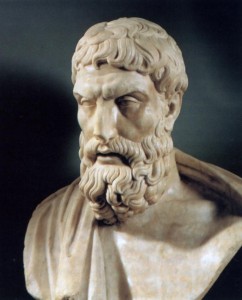 The virtues: Epicurus’ hedonism was widely denounced in the ancient world as undermining traditional morality. Epicurus, however, insists that courage, moderation, and the other virtues are needed in order to attain happiness. However, the virtues for Epicurus are all purely instrumental goods–that is, they are valuable solely for the sake of the happiness that they can bring oneself, not for their own sake. Epicurus says that all of the virtues are ultimately forms of prudence, of calculating what is in one’s own best interest. In this, Epicurus goes against the majority of Greek ethical theorists, such as the Stoics, who identify happiness with virtue, and Aristotle,who identifies happiness with a life of virtuous activity.
The virtues: Epicurus’ hedonism was widely denounced in the ancient world as undermining traditional morality. Epicurus, however, insists that courage, moderation, and the other virtues are needed in order to attain happiness. However, the virtues for Epicurus are all purely instrumental goods–that is, they are valuable solely for the sake of the happiness that they can bring oneself, not for their own sake. Epicurus says that all of the virtues are ultimately forms of prudence, of calculating what is in one’s own best interest. In this, Epicurus goes against the majority of Greek ethical theorists, such as the Stoics, who identify happiness with virtue, and Aristotle,who identifies happiness with a life of virtuous activity.
Epicurus thinks that natural science and philosophy itself also are instrumental goods. Natural science is needed in order to give mechanistic explanations of natural phenomena and thus dispel the fear of the gods, while philosophy helps to show us the natural limits of our desires and to dispel the fear of death.
Justice: Epicurus is one of the first philosophers to give a well-developed contractarian theory of justice. Epicurus says that justice is an agreement “neither to harm nor be harmed,” and that we have a preconception of justice as “what is useful in mutual associations.” People enter into communities in order to gain protection from the dangers of the wild, and agreements concerning the behavior of the members of the community are needed in order for these communities to function, e.g., prohibitions of murder, regulations concerning the killing and eating of animals, and so on. Justice exists only where there are such agreements.
Like the virtues, justice is valued entirely on instrumental grounds, because of its utility for each of the members of society. Epicurus says that the main reason not to be unjust is that one will be punished if one gets caught, and that even if one does not get caught, the fear of being caught will still cause pain. However, he adds that the fear of punishment is needed mainly to keep fools in line, who otherwise would kill, steal, etc. The Epicurean wise man recognizes the usefulness of the laws, and since he does not desire great wealth, luxury goods, political power, or the like, he sees that he has no reason to engage in the conduct prohibited by the laws in any case.
Although justice only exists where there is an agreement about how to behave, that does not make justice entirely ‘conventional,’ if by ‘conventional’ we mean that any behavior dictated by the laws of a particular society is thereby just, and that the laws of a particular society are just for that society. Since the ‘justice contract’ is entered into for the purpose of securing what is useful for the members of the society, only laws that are actually useful are just. Thus, a prohibition of murder would be just, but antimiscegenation laws would not. Since what is useful can vary from place to place and time to time, what laws are just can likewise vary.